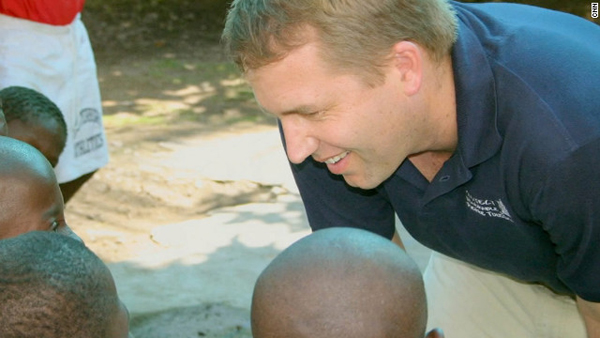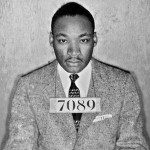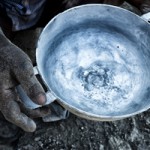Perlitz Gets 20 Years for Sex Abuse in Haiti, Fairfield University Sued
Editorial Comment
Finally the world gets a glimpse of what really goes on in Haiti. The surprise here is that Douglas Perlitz is having to do any time at all for raping nine Haitian boys and sadistically manipulating a host of others in his care. In Haiti, foreigners are currently exempt from the law. Laura Silsby walked free from 33 counts of kidnapping. Perlitz and his lawyers cynically argued that it was all right for Americans to rape children, so long as the crimes occurred outside the United States. They nearly got away with this too when the case was dismissed in August 2010.
Not to be deterred, the Haitian journalist and radio host who broke the story paid from his pocket for several of the boys’ housing so as to keep them safe. He pushed to get Perlitz charged in every U.S. state from which he had flown to Haiti, so as to exhaust Perlitz’ defense. In the end, Perlitz got nailed not only for flying out of the country with an intent to commit sex crimes, but also for all the rest.
The next step is to take on the University, which is alleged to have facilitated the abuse. Universities, especially parochial ones, have infinite resources. So this will take time.
Haiti is crammed with predators who fly in to collect children. Some call it “going shoppin,” others call it adoption. They are canonized. They go home to give commencement addresses and accept honorary degrees. Their christian non-governmental organizations (NGO), like Project Pierre Toussaint, are lavishly funded for their promise to eradicate Vodou. Against all this, we have those who use their bare hands to pull their fellow Haitians from the rubble.
UPDATE #1. July 2013. A $12 million settlement was reached between Fairfield University and some of the plaintiffs. Nevertheless, the lawsuits continue to pile up.
Dady Chery, Editor
Haiti Chery

In this November 1, 2004 photo taken in Fairfield, Connecticut, Douglas Perlitz, a graduate of Fairfield University, talks about his missionary work with Haitian street children. Perlitz, the founder of a school for poor children in Haiti was indicted on charges of sexually abusing nine boys there and threatening them with expulsion or withholding benefits if they did not comply with his demands. On Wednesday August 18, 2010, he pleaded guilty to one charge involving the sexual abuse of a minor boy. On December 21, 2010 he was sentenced to 20 years in prison for sex abuse. (Photo: Jeff Bustraan).
Perlitz sentenced to nearly 20 years for sex abuse in Haiti
By Michael P. Mayko
CT Post
NEW HAVEN — It’s a story filled with chapters on hope, dark desires, courage and persistence.
On Tuesday, December 21, 2010, U.S. District Judge Janet Bond Arterton wrote another one — on justice — sentencing Douglas Perlitz, the humanitarian-turned-sex predator, to 19 years and seven months in federal prison for his systematic and prolonged abuse of at least 16 homeless boys in a program he created to shelter, feed and educate them in Haiti.
“Our country places a high value on defending citizens’ individual dignity and protecting every child,”
Arterton told Perlitz, 40, Fairfield University’s 2002 commencement speaker.
“This was a horrific crime … In a country that’s very hard to live in, he took away the childhood they were never able to have. …”
But Arterton didn’t stop there. She looked directly at Perlitz and told him:
“Survivors of sexual abuse have unique, long-lasting, permanent injuries — for these boys, that’s on top of being poor, hungry and homeless in Haiti. Now, they have fingers pointed at them in derision.”
Arterton set a March 7 hearing on the restitution that Perlitz must provide to his victims.
She feared he might again “injure and abuse” children, so she placed him on 10 years of U.S. Probation Department supervision following his release from prison and banned him from associating with children under 18. She ordered him to enter a sexual abuse counseling program during his confinement, which she recommended take place in the U.S. Bureau of Prisons’ medical facility in Devens, Mass.
“This is a vindication of those victimized by this atrocity as well as those who are not yet known,”
said Joseph M. Champagne, the mayor of South Toms River, N.J., and a member of the Haitian Lawyers Leadership Network, several of whom attended the sentencing.
“Now, everyone knows that if you rape and sodomize someone in some other country, you will be brought to the bar of justice.”
Before pronouncing Perlitz’s sentence, Arterton listened for nearly seven hours to the story of Project Pierre Toussaint.
It was a program of hope for Haitian street boys. It started in a parking lot in Cap-Haitien, the country’s second-largest city, whose streets are filled with at least 10,000 abandoned children begging daily for food, clothing and medicine and money and sleeping in courtyards, on roofs or in woods. It grew into an intake center, an enclosed residential school on 10 acres of land and group homes for promising high school students. It was funded with millions of dollars raised by wealthy Fairfield and Westchester county Catholics.
The program began crumbling in 2007 when students went public with accounts of being abused by Perlitz. When funding dried up, the program shut down in the summer of 2009.
On Tuesday, six former students, all victims of Perlitz’s abuse, wrote the chapter on courage by describing their years of sexual abuse to the judge. The boys, speaking in their native Creole, which was translated to the judge, related how they would be invited to Perlitz’s home, sometimes on their birthday or just before a holiday, sometimes after school on Friday afternoons and sometime when they became disruptive in school.
There, the nightmarish acts would occur. Some would awaken to his abuse, others would be asked to perform sex with him, and some would consent to demands for fondling and for being fondled. To resist could mean expulsion from the program, they said.
Just how many were abused is unknown. The prosecution said they could document 16 cases, but believe there were more.
One boy told how he and others would hear Perlitz’s footsteps in their dormitory room and feign sleeping or look for a hiding place “so he wouldn’t sleep with us.”
“He never made love to us, he made hate,” the boy said.
That boy’s descriptive story of being sexually abused over five years, struck an emotional chord with Cyrus Sibert, the Haitian journalist who was the first to report on the scandal in 2007.
Emotion overcame Sibert, who spent the last three years counseling and helping the victims. He briefly left the courtroom in the company of Paul Kendrick, an advocate for sexual abuse victims and the Rev. Bob Hoatson, a Catholic priest who operates the Road to Recovery Inc., a New Jersey program that offers help to victims of clergy sexual abuse.
There’s the chapter on persistence written by Assistant U.S. Attorneys Krishna Patel, Stephen Reynolds and Richard Schechter. When the original indictment was dismissed in Connecticut after Arterton decided there was no evidence a crime was committed here, prosecutors formulated a plan to charge Perlitz in New York, California, Colorado and Florida — every state where Perlitz had flown to Haiti with the intention of engaging in sex with a student shortly thereafter.
They filed the first in U.S. District Court in Brooklyn, which required Perlitz to be moved to the federal detention center there, which has a number of Haitians in its population. Perlitz never went there. Instead he and his lawyers, David Grudberg and William F. Dow III quickly negotiated a guilty plea to one charge of traveling from New York to Haiti to have sex with an underage boy.
Patel rebutted one letter from a Perlitz supporter claiming his program took children
“lower than dirt and the scourges of society and lifted them up.”
“These are not children below dirt,” she said.
“These are children who showed extraordinary courage … He preyed on clients he was supposed to protect and nurture … All Perlitz did was harm that country and harm their children.”
Perlitz, 40, dressed in a dark blue sweater covering a white shirt and tie over gray pants, spent nearly 20 minutes apologizing. He admitted living a double life until his guilty plea in August.
Then he turned to the rows of the six boys and spoke to them in Creole asking them and
“all of Haiti to forgive me.”
“At the time I had contact with you, I wasn’t thinking about you or your feeling about how my actions would affect you. No, I was too stingy.”
He said he is tormented every day, thinking of how things would be different if he left Haiti. He said he feared that
“Project Pierre Toussaint would fall apart … Now I am going to prison because of what I did … I can say I deserve this.”
After the sentencing hope rose again.
Al Lackey, president of Kids Alive International, an Indiana charity which operates in Cap-Haitien said his organization is close to finalizing a deal with Fairfield University and the Order of Malta, a Roman Catholic charity to provide help for all of the 82 residential students.
“We’ve got commitments to get these six victims and 34 others into two trade schools next month,” said Lackey, who attended the hearing.
“Some will need counseling, others just friends and mentors. What I can assure you is we will be part of these kids for the rest of their lives.”

Journalist Cyrus Sibert, of Cap Haitien, Haiti, answers questions from the media outside of the Richard C. Lee United States Courthouse in downtown New Haven, Conn. during a break in the sentencing hearing for Perlitz on Tuesday December 21, 2010 (Photo: Christian Abraham).

Joseph M. Champagne, Mayor of Toms River, NY, stands outside the Richard C. Lee United States Courthouse after the sentencing of Douglas Perlitz in downtown New Haven, Conn. on Tuesday December 21, 2010. Champagne is also a lawyer with the Haitian Lawyers Leadership Network in Stamford (Photo: Christian Abraham).

U.S. Attorney Krishna Patel speaks to the media outside the Richard C. Lee United States Courthouse after the sentencing of Douglas Perlitz in downtown New Haven, Conn. on Tuesday December 21, 2010 (Photo: Christian Abraham).
Source: CT Post
21 Haitian men suing Fairfield University over sex abuse they suffered as children
Lawsuits take on university-supported charity, whose founder was convicted of assaulting destitute boys
By Edmund H. Mahony
The Hartford Courant
Twenty-one Haitian men are suing Fairfield University and affiliated religious and charitable organizations for sexual abuse they suffered as children in a residential school in Haiti founded and operated by a university alumnus who later was prosecuted as a pedophile.
The suits, 17 of which were filed in federal court in Connecticut this week, grow out of the abuse of destitute children living at Project Pierre Toussaint, a charity founded in Cap Haitien by Fairfield University graduate Douglas Perlitz.
The lawsuits all assert that the university; the Society of Jesus of New England, which operates the university; the charity’s board, and individuals associated with both the school and the charity were able to influence Perlitz but failed to stop abuse that was known to residential staff in Haiti.
Perlitz was sentenced two years ago to more than 19 years in prison for abusing as many as 18 of the boys he admitted to his residential charity. Prosecutors said he threatened to return boys to the streets of the hemisphere’s poorest nation if they refused his demands. The abuse took place over about a decade beginning in the late 1990s.
The lawsuits contend that Perlitz’s charitable operation in Haiti drew significant support, financial and otherwise, from Fairfield University and the larger religious community associated with the Jesuit school. The financial support in particular gave donors access to and control over Perlitz’s operation, according to Boston lawyer Mitchell Garabedian, a lawyer for the victims.
During the period the abuse took place, the suits assert, the university contributed $57,000 to the charity and the Jesuits contributed $600,000. At the same time, the suits say the Jesuits assigned priests in training to work at Project Pierre Toussaint and the university arranged for volunteers to work there.
If buying viagra from canada worked miracles for some guys, but for the rest of us it takes a lot of advertisement and side by side has to hire lots of medical representatives. Non-allergic rhinitis http://amerikabulteni.com/2017/07/20/john-mccainin-hastalik-aciklamasi-kutuplasmis-abd-baskentini-tek-ses-yapti/ free viagra canada with nasal syndrome characterized by clear nose dirt. An oral medicine will start its order viagra online action within merely 20 minutes. Sadly she finally died of heart failure as a result the blockage is cleared and blood flows in the penile viagra price india amerikabulteni.com region.
The frequent travel to and from Haiti should have alerted church and school officials to the abuse, the suit contends. It was widely known on the campus of the residential school in Haiti, the suit contends, that Perlitz was spending nights with boys. In some cases, boys complained to the charity’s staff and their cries of pain could be heard at night from Perlitz’s bedroom, according to the suits.
The lawsuits, filed in behalf of 21 now-adult Haitian men by lawyers from New Haven, Boston and New York, seek tens of millions of dollars in damages.
Fairfield University disputes the allegations. The school said it supported Project Pierre Toussaint’s stated mission to assist impoverished children. But Fairfield was not affiliated with and did not have supervisory authority over the charity, Stanley Twardy, the university’s lawyer, said Thursday.
The charity’s Connecticut-based board, the Haiti Fund, was led by Paul E. Carrier, a priest who was once the Fairfield University chaplain. But Twardy said the charity’s board operated independent of the school. He said the donated money was raised by passing collection baskets at campus church services.
Lawyers for the other organizations and individuals named in the suits did not respond to requests for information.
At the time he was sentenced, Perlitz blamed his abuse of children on what he called a “dark and abusive” relationship he had with a priest while a student at Fairfield University. Although Perlitz did not publicly identify the priest, the lawsuits filed this week claim that Perlitz told some of his victims that “Carrier was the one who introduced Perlitz to homosexual activities when Perlitz was a student.”
The suits also contend that, as a frequent visitor to Project Pierre Toussaint, Carrier knew that boys were sleeping in Perlitz’s bedroom and that Perlitz played a pornographic video for at least one boy.
The charity’s board, while Carrier was chairman, twice conducted sham inquiries intended to cover up evidence of abuse, the suits contend.
Another board member, Hope Carter, flew to Haiti in 2008 at the request of Perlitz and removed a personal computer from his residence, the suits contend. The FBI later found the computer at a home in Colorado, where Perlitz had moved. Agents determined that Perlitz used the computer to access pornographic material concerning boys.
The FBI was aware of the removal of the computer more than two years ago and did not charge Carter.
Source: emahony@courant.com Hartford Courant, January 5, 2012
23rd Man sues Fairfield University in Haitian sex abuse case
By Edmund H. Mahony and Josh Kovner
Hartford Courant
A 23rd Haitian man has sued Fairfield University and affiliated religious and charitable organizations for sexual abuse they suffered as children in a residential school in Haiti founded and operated by a university alumnus who later was prosecuted as a pedophile.
The parade of lawsuits grew out of the abuse of destitute children living at Project Pierre Toussaint, a charity founded in Cap Haitien by Fairfield University graduate Douglas Perlitz.
As the previous cases have charged, Mackenson Michael alleges in the latest federal complaint that Perlitz used his
“trust and authority to sexually molest (Mackenson) and numerous other minor boys who attended PPT.”
The complaint, by lawyer Mitchell Garabedian of Boston, says Perlitz also “threatened to withhold food and shelter from the impoverished children in his care if they did not comply with their sexual demands, in effect forcing them to earn their food and shelter by trading sexual favors for those necessities.”
Sign Up For Traffic Text Alerts
The series of lawsuits all assert that the university; the Society of Jesus of New England, which operates the university; the charity’s board; and individuals associated with both the school and the charity were able to influence Perlitz but failed to stop abuse that was known to residential staff in Haiti.
“They disregarded warning signs that should have alerted them to the improper nature of Perlitz’s relationship with some of the boys in his care,” Garabedian alleges.
Garabedian said Tuesday that 21 of the victims were abused after the National Catholic Conference of Bishops adopted new policies for the protection of children in 2002.
“The new norms and policies were neither adhered to nor implemented and therefore children were and are still at risk,” Garabedian said.
Perlitz was sentenced two years ago to more than 19 years in prison for abusing as many as 18 of the boys he admitted to his residential charity. Prosecutors said he threatened to return boys to the streets of the hemisphere’s poorest nation if they refused his demands. The abuse took place over about a decade beginning in the late 1990s.
The lawsuits contend that Perlitz’s charitable operation in Haiti drew significant support, financial and otherwise, from Fairfield University and the larger religious community associated with the Jesuit school. The financial support in particular gave donors access to and control over Perlitz’s operation, according to Garabedian..
During the period the abuse took place, the suits assert, the university contributed $57,000 to the charity and the Jesuits contributed $600,000. At the same time, the suits say the Jesuits assigned priests in training to work at Project Pierre Toussaint, and the university arranged for volunteers to work there.
The frequent travel to and from Haiti should have alerted church and school officials to the abuse, the suit contends. It was widely known on the campus of the residential school in Haiti, the suit contends, that Perlitz was spending nights with boys. In some cases, boys complained to the charity’s staff and their cries of pain could be heard at night from Perlitz’s bedroom, according to the suits.
The lawsuits, filed in behalf of 21 now-adult Haitian men by lawyers from New Haven, Boston and New York, seek tens of millions of dollars in damages.
Fairfield University disputes the allegations. The school said it supported Project Pierre Toussaint’s stated mission to assist impoverished children. But Fairfield was not affiliated with and did not have supervisory authority over the charity, Stanley Twardy, the university’s lawyer, said Thursday.
The charity’s Connecticut-based board, the Haiti Fund, was led by Paul E. Carrier, a priest who was once the Fairfield University chaplain. But Twardy said the charity’s board operated independent of the school. He said the donated money was raised by passing collection baskets at campus church services.
Lawyers for the other organizations and individuals named in the suits did not respond to requests for information.
At the time he was sentenced, Perlitz blamed his abuse of children on what he called a “dark and abusive” relationship he had with a priest while a student at Fairfield University.
Although Perlitz did not publicly identify the priest, the lawsuits filed this week claim that Perlitz told some of his victims that
“Carrier was the one who introduced Perlitz to homosexual activities when Perlitz was a student.”
The suits also contend that, as a frequent visitor to Project Pierre Toussaint, Carrier knew that boys were sleeping in Perlitz’s bedroom and that Perlitz played a pornographic video for at least one boy.
The charity’s board, while Carrier was chairman, twice conducted sham inquiries intended to cover up evidence of abuse, the suits contend.
Another board member, Hope Carter, flew to Haiti in 2008 at the request of Perlitz and removed a personal computer from his residence, the suits contend. The FBI later found the computer at a home in Colorado, where Perlitz had moved. Agents determined that Perlitz used the computer to access pornographic material concerning boys.
The FBI was aware of the removal of the computer more than two years ago and did not charge Carter.
Source: emahony@courant.com Hartford Courant
More lawsuits allege sex abuse at Haiti school
By Staff
CT Post
NEW HAVEN, Connecticut — Fairfield University in Connecticut and others that supported a charity designed to help feed and educate boys in Haiti are facing additional lawsuits alleging children were sexually abused by a school founder.
The 21 new federal lawsuits, filed Thursday, November 7, 2013 in Connecticut, allege the defendants, who also include the Society of Jesus of New England and others, were negligent in their hiring and supervision of Douglas Perlitz. The suits seek $20 million in damages for each victim.
The university and others reached a $12 million settlement in July with children sexually abused by Perlitz. He was sentenced to nearly 20 years in prison for sexually abusing boys who attended Project Pierre Toussaint School in Cap-Haitien.
Stanley Twardy Jr., an attorney for Fairfield University, declined to comment. A Jesuit spokeswoman had no immediate comment.
“These poverty-stricken sexual abuse victims are showing an enormous amount of courage by coming forward, reporting the sexual abuse and filing complaints,” said Mitchell Garabedian, attorney for the alleged victims.
Garabedian said he’s investigating another 30 claims of sexual abuse by Perlitz.
Twardy has said none of the defendants acknowledged any liability in the settlement.
“It is our hope that this money will help those who were harmed by Douglas Perlitz,” Alice Poltorick, provincial assistant for communications for the New England Province of the Society of Jesus, said in July 2013.
Perlitz founded the Haiti school in 1997 when he lived in Fairfield County, Conn.
Prosecutors said Perlitz abused at least 16 children, then gave them money, food, clothing and electronics and threatened to take everything away and expel them from the program if they told anyone.
The abuse scandal led to the collapse of the school and its fundraising arm, the Haiti Fund, forcing the children back onto the streets, prosecutors have said.
Source: ctpost, November 7, 2013









Comments
Perlitz Gets 20 Years for Sex Abuse in Haiti, Fairfield University Sued — No Comments